Wiktory/iStock/GettyImages
Like all meats, raw chicken has the potential to carry disease-causing bacteria, including salmonella, Listeria and Escherichia coli, often called E. coli. Washing the chicken is no longer recommended because the practice generally does more harm than good. It's still important to follow other standard procedures, like keeping chicken refrigerated and cooking it to a safe temperature.
Safe Start
Raw, packaged chicken shouldn't be washed before you cook it, advises the U.S. Department of Agriculture. Washing the chicken does not destroy bacteria, but can spread it to the sink, the countertop and other surfaces, where it can infect other foods. Instead, carefully remove the packaging. The package may contain some liquid. This liquid isn't blood, but is mostly water absorbed by the meat during the chilling process. Pour the liquid down the sink, being carefully not to splash it. Dispose of the packaging and wash your hands with soap and warm water.
Smart Shopping
Washing chicken does nothing to improve its taste or texture, nor does it make it safer. Instead, your first step for great tasting, safe chicken starts at the grocery store. Make the meat section your last stop before you check out. Buy only chicken that feels cold. Avoid any that have an off-odor or appear slimy or yellow. Refrigerate the chicken promptly at 40 degrees Fahrenheit or lower and cook it within two days. For longer storage, freeze the chicken at 0 F. Although chicken will stay safe indefinitely while frozen, it begins to dry out and lose its flavor after a few months. Wrap the chicken in aluminum foil or plastic wrap if you plan to store it longer than two or three months. Use whole chicken within one year. Use chicken pieces within nine months.
Take Its Temperature
Although refrigerating or freezing chicken slows bacterial growth, it doesn't kill the bacteria. Proper cooking is the only way to kill bacteria and minimize the risk of foodborne illness. When chicken is cooked, the skin becomes firm, white and opaque. But don't judge whether chicken is cooked based on its appearance alone. To know for sure that chicken's cooked thoroughly, insert a meat thermometer into the thickest portion of the meat. When cooked through, it should register 165 F.
Prep Work
You don't need to wash raw chicken before cooking it, but there are a few steps that will make chicken taste better. First, salt the chicken after you remove the packaging and place it back in the refrigerator for 24 hours. This simple step allows the salt to penetrate the meat for a more flavorful, juicy bird. You can also make a brine for the chicken from salt and water, if you prefer. Brines are especially good for whole roasted chicken. Combine water and salt in a saucepan at a ratio of 1/2 cup salt to 2 quarts water. Add seasonings, such as sugar, rosemary or juniper berries. Allow the brine to cool to room temperature before you add the chicken. Refrigerate a whole chicken in the brine for four hours. Refrigerate smaller pieces for two hours and reduce the salt by one-half.
Related Articles

Can You Put Raw Chicken in a Rice Stew?
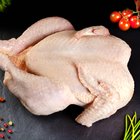
How to Dress a Chicken for Cooking

How to Make Crock-pot Chicken

How to Defrost a Chicken in a ...
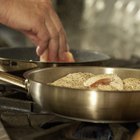
Can I Cook Chicken That's Been Thawed ...

How to Par-Cook Chicken Before Frying

Do You Have to Wash Your Hands When You ...

The Proper Way to Inject Marinade Into ...

Do You Have to Cook the Chicken After ...
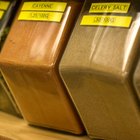
How to Cook Boneless & Skinless Chicken ...

How to Puree Chicken
How to Cook Shredded Chicken in a ...

Can I Cook a Whole Chicken Without ...
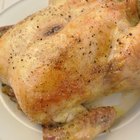
How to Bake Chicken at 375
Easy Orange Chicken Recipe
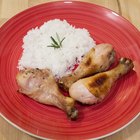
How to Cook Chicken Legs With Italian ...

Is it Safe to Cook Chicken 2 Days After ...
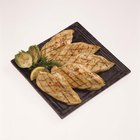
How to Cook Boneless Chicken Breasts to ...
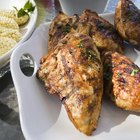
Can I Stop Cooking a Chicken Halfway & ...
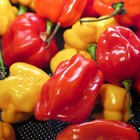
How to Cook Crispy Jerk Chicken in the ...
References
Writer Bio
Julie Christensen is a food writer, caterer, and mom-chef. She's the creator of MarmaladeMom.org, dedicated to family fun and delicious food, and released a book titled "More Than Pot Roast: Fast, Fresh Slow Cooker Recipes."